Search Results for 'turtle farm'
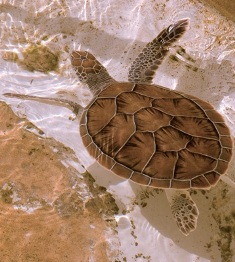
UK MP to press for no turtle meat for tourists
 (CNS): A British Conservative MP will be coming to the CaymanIslands next week to throw his political weight behind the campaign to persuade local restaurants not to sell turtle meat to visitors. A UK charity which is on a drive to transition the Cayman Turtle Farm (CTF) from a meat supplier into a purely conservation-based facility is taking aim at the tourism market as a starting point for reducing what demand exists for the meat. Matthew Offord, the Tory representative for Hendon in North London, will be hosting a reception here and also helping with the UK-based campaign to get the Conservative government to advise UK travellers at least not to eat the meat from the endangered species.
(CNS): A British Conservative MP will be coming to the CaymanIslands next week to throw his political weight behind the campaign to persuade local restaurants not to sell turtle meat to visitors. A UK charity which is on a drive to transition the Cayman Turtle Farm (CTF) from a meat supplier into a purely conservation-based facility is taking aim at the tourism market as a starting point for reducing what demand exists for the meat. Matthew Offord, the Tory representative for Hendon in North London, will be hosting a reception here and also helping with the UK-based campaign to get the Conservative government to advise UK travellers at least not to eat the meat from the endangered species.
Eating turtle in the UK is illegal and in the wake of a recent statement from the UK government advising visitors to Japan not to eat live sushi, World Animal Protection (formerly the World Society for the Protection of Animals) is hoping it can get similar support for a travel advisory along the same lines for eating turtle in Cayman.
Simultaneously, Offord and the WAP will be pressing restaurants here to voluntarily stop promoting the meat to tourists. So far, the Grand Old House is the first and only restaurant to remove turtle from its menu and has agreed to sell it only to locals who pre-order the dish.
Professor Neil D'Cruze from the WAP told CNS that he appreciates that a ban maybe difficult to implement but he is hoping to persuade more restaurants to take the meat off the menu altogether voluntarily or adopt the same position as the Grand Old House, where the campaign launch will be held. The charity also wants to persuade the Department of Tourism (DoT) to support the idea of at least not promoting the meat to visitors as it believes it stimulates a false and unnecessary demand.
Concerned that the CTF has no idea what the real demand for the meat is even from locals, D’Cruze said he was delighted to hear that the Department of Environment has received funding from the UK's department of food and rural affairs' Darwin Initiative to begin a comprehensive survey of that demand and research into the genetic profile of turtles nesting on the beaches to identify the connections of the local wild turtles to the Farm.
That project is unrelated to the WAP campaign and part of the DoE's broader research work into the endangered species and their survival in the wild. It is being led by Dr Ana Nuno from the University of Exeter and is expected to provide the first truly objective information about the origin of turtles that are breeding in local waters, as well as get a true assessment of how much demand there is for meat and the issues surrounding poaching.
The WAP maintains that the CTF slaughters animals without properly assessing demand and also keeps huge numbers of the animals without knowing the true level of consumption and whether it is necessary to breed so many. D'Cruze said that any figures that can give a truer picture of how much and how many local people do eat the meat may help reduce the numbers held at the farm.
Understanding that the effort to transition the facility to conservation will be a long process, he said that simply reducing the numbers held at the farm, which are estimated to currently be more than 9,000 animals, would be a step in the right direction.
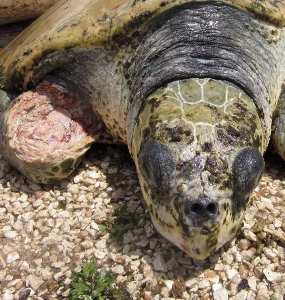
CTF marks Turtle Day despite latest criticisms
 (CNS): The Cayman Turtle Farm has issued a press release indicating that the facility is marking World Turtle Day on Friday which was designed to raise awareness and promote the conservation of the endangered species. In the wake of yet more damning criticisms about the Farm’s treatment of its turtles being bred for meat and its lack of genuine conservation credentials by the British based charity the WSPA the Farm is making the most of the day which has been sponsored by American Tortoise Rescue since 2000. “Every day at Cayman Turtle Farm: Island Wildlife Encounter is really a World Turtle Day,” said Chief Marketing Officer Tina Trumbach, despite the allegations.
(CNS): The Cayman Turtle Farm has issued a press release indicating that the facility is marking World Turtle Day on Friday which was designed to raise awareness and promote the conservation of the endangered species. In the wake of yet more damning criticisms about the Farm’s treatment of its turtles being bred for meat and its lack of genuine conservation credentials by the British based charity the WSPA the Farm is making the most of the day which has been sponsored by American Tortoise Rescue since 2000. “Every day at Cayman Turtle Farm: Island Wildlife Encounter is really a World Turtle Day,” said Chief Marketing Officer Tina Trumbach, despite the allegations.
“But today we’re celebrating with some special activities that we hope our guests will join in and support, including a limited edition T-shirt sale, the unveiling of a new mural in our Education Centre & Hatchery, and educational seminars on ‘Sea Turtles in Cayman’ by local experts throughout the day,” she added.
Research and reports by WSPA have, over the last two years, revealed a catalogue of issues relating to poor husbandry, diseases, cannibalism, deformities, breeding problems, mass deaths as a result of negligence and many more problems at the Farm. The charity has criticised the release programme, which has now been suspended as a result of the problems with farmed turtles that could be transmitted to wild populations, as well as the dumping of waste into the ocean. On every occasion the Farm has sought to dismiss and down play the charities allegations as part of its campaign to transition the farm from a meat shop into a genuine conservation facility.
The WSPA is currently focusing on trying to persuade the Cayman authorities to ban the sale of turtle meat to tourist and stop the false demand. The government has since agreed to fund the department of the environment to examine and assess the demand for turtle meat locally and to consider the possible end of sales to visitors.
See details of the Farms plans in the release posted below for World Turtle Day
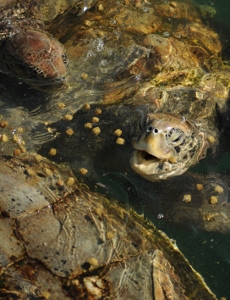
UK to fund turtle survey
 (CNS): Experts from the Department of Environment (DoE) have received funding from the UK’s Darwin Project to conduct research on how much turtle meat is being consumed locally and to look at the impact of the Cayman Turtle Farm’s release programme on the wild population. The DoE will look at how many of the wild turtles nesting here were originally from the farm and other data. Following meetings with the World Society for the Protection of Animals (WSPA) and government this month, officials said talks had been positive, with the charity accepting the cultural significance of turtle to Cayman while government accepted the need to stop promoting meat to visitors and rethink releasing farmed turtles into the wild.
(CNS): Experts from the Department of Environment (DoE) have received funding from the UK’s Darwin Project to conduct research on how much turtle meat is being consumed locally and to look at the impact of the Cayman Turtle Farm’s release programme on the wild population. The DoE will look at how many of the wild turtles nesting here were originally from the farm and other data. Following meetings with the World Society for the Protection of Animals (WSPA) and government this month, officials said talks had been positive, with the charity accepting the cultural significance of turtle to Cayman while government accepted the need to stop promoting meat to visitors and rethink releasing farmed turtles into the wild.
“These concerns will be investigated further through research conducted by the Department of Environment and their project partners via Darwin Plus funding made available by the UK Government,” the Cayman government said in a joint release with the WSPA, which has spent the last two years campaigning to transition the Cayman Turtle Farm (CTF) into a real conservation research centre.
Following a more cordial meeting with the new administration and WSPA than in the past, the government agreed to address all the appropriate concerns that have been raised by the charity about the conditions at the farm as well as to undertake the research.
“This long-term study will also look into the effectiveness of the turtle-release programme and potential contribution of releases to wild populations of turtles,” it said. The WSPA said it was pleased to learn that the future release of farm-raised turtles has been suspended until the findings of the research are available.
The announcement of the research and the funding follows concerns raised by a report from the UK parliament’s Environmental Audit Committee on Sustainability in the UK Overseas Territories, which specifically pointed to issues at the Cayman Turtle Farm. The committee visited the public section as well as its behind-the-scenes turtle breeding operations and found discrepancies surrounding the farm’s claims in relation to demand in Cayman for turtle meat.
“There remains some dispute whether the Cayman Turtle Farm is creating an artificial market in the tourist industry by encouraging visitors to eat a meat that the majority of indigenous people now shun,” the report noted. The farm has argued that wild turtles would be poached were it not for the farmed turtles it raises but the 25% price reduction last year raises questions about the real level of demand.
The committee also found that the cost of the government-owned company and the almost $10 million annual subsidy from the public purse, an amount four times greater than the annual budget of the Department of Environment and 20 times greater than funding for the Cayman Islands National Trust, was of significant concern to the environmental committee. The committee also drew attention in the report to the August 2012 incident when over 300 green turtles at the CTF were killed after a leak from a seawater pipe left them to dry out without water in a holding container.
Committee members also witnessed several large wild turtles trying to swim from the sea up the sewage outflow channel from the farm when they visited.
“It is conceivable that those were female turtles which had been released from the farm and which were following their natural instinct to return to where they were hatched to lay their eggs,” they observed in the report and welcomed WSPA’s proposal to transition the farm to a wildlife rehabilitation and rescue facility.
“We are pleased that the UK Environment Audit Committee has brought further attention to the extensive ongoing problems at the Cayman Turtle Farm, including its significant drain on the public purse, considerable animal welfare problems, and creation of an international market for turtle meat, which is stoking demand that would not otherwise exist for an endangered species,” said Dr Neil D’ Cruze, WSPA Head of Wildlife Policy and Research, when he arrived in Cayman recently.
However, following the constructive talks with the DoE and other government officials, he said the charity was delighted that funding had been secured to investigate the true level of demand for turtle meat and the impact of releasing farmed turtles.
“It is clear that the information generated by this study will greatly inform effective decision making regarding the long-term future of the farm, including the possibility of its transition into a rehabilitation and release facility,” Dr D’Cruze added. “We also applaud the Cayman Islands Government for working with us in such a positive manner to identify critical short-term steps that can be taken to help alleviate the immediate animal welfare concerns at the farm.”
The charity is particularly pleased that there will be no more turtle releases from the farm until the conclusions of this study are made available and that various stakeholders will explore how to limit the promotion of sea turtle meat to visiting international tourists.
The facility is the last remaining sea turtle farm in the world, with over 9,500 endangered green sea turtles currently held there, having been bred to meet what is now a questionable demand. The WSPA said it believes the farm has lost its original sense of purpose and is now seriously undermining the health and welfare of sea turtles farmed on its premises.

Visitor turtle meat ban posed
 (CNS): The World Society for the Protection of Animals, which is continuing its campaign to transform the Cayman Islands Turtle Farm into a conservation facility, is hoping to persuade government to ban the sale of turtle meat to visitors. Representatives from the international charity, which is based in the UK, arrived in Cayman on Sunday ahead of meetings with government officials, including the tourism minister, and with restaurant owners to galvanize support for the proposal. The WSPA visit comes against the backdrop of more concerns about releasing farmed turtles into the wild from the facility, which is still draining some $10 million per annum from the public purse.
(CNS): The World Society for the Protection of Animals, which is continuing its campaign to transform the Cayman Islands Turtle Farm into a conservation facility, is hoping to persuade government to ban the sale of turtle meat to visitors. Representatives from the international charity, which is based in the UK, arrived in Cayman on Sunday ahead of meetings with government officials, including the tourism minister, and with restaurant owners to galvanize support for the proposal. The WSPA visit comes against the backdrop of more concerns about releasing farmed turtles into the wild from the facility, which is still draining some $10 million per annum from the public purse.
The WSPA believes that the new government is willing to consider this proposal, which would not impact local consumption at this point but, the charity believes, such a ban would be a step in the right direction.
Dr Neil D’Cruze, Head of Wildlife Research & Policy at WSPA, said he was visiting to follow up on previous conversations about this possibility during the charity's last visit to the Cayman islands and to see for himself how restaurateurs and the local hotels feel about serving the dish to tourists.
“WSPA is here to talk with the government about the sale of sea turtle meat to tourists visiting the Cayman Islands. In addition to our animal welfare concerns, WSPA is concerned about the impact that this is having on wild sea turtle conservation efforts,” he told CNS. “Evidence suggests that tourists do not come to the Cayman Islands to eat sea turtle meat. By encouraging tourists to do so, the CTF is stimulating international demand that would not otherwise exist for an endangered wild animal.”
Although turtle meat is available predominately in restaurants serving the domestic market, several restaurants do still serve a limited amount of turtle dishes to tourists.
“We are hoping to advance on our prior positive conversations with the Caymanian Government by discussing the feasibility of ending the sale of sea turtle meat to visiting tourists,” D’Cruze said.
The WSPA and the Cayman Turtle Farm have been engaged in a war of words for over a year following a damning report by the charity. After its publication, the CTF commissioned its own review, which led to a number of changes. However, the farm still appears to be dealing with husbandry issues.
Despite having boosted production last year, with some 9,000 turtles housed there, the CTF cancelled the annual release programme planned during Pirates Week last year. Although the release is an important part in what the farm claims are its conservation credentials, fears that have been long held by many experts that farmed turtles may have a negative impact on those in the wild appear to have influenced the farm management’s decision to cancel the release.
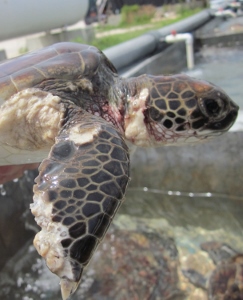
Turtles can’t be released


Farm needs to measure real demand for meat
 (CNS Business): The Cayman Turtle Farm’s decision to reduce the price of its meat without any real assessment of the true size of the local demand for the product is a bad business model, an international charity has noted, especially given the massive subsidy that the farm receives from the public purse. Dr Neil D’Cruze from the World Society for the Protection of Animals (WSPA), who is leading the campaign for the CTF to change its model from a butchery to a full conservation facility, said manipulating the price of the meat to stimulate demand without understanding where the demand comes from or how much of a demand there is from local people makes no sense. Read more and comment on CNS Business
(CNS Business): The Cayman Turtle Farm’s decision to reduce the price of its meat without any real assessment of the true size of the local demand for the product is a bad business model, an international charity has noted, especially given the massive subsidy that the farm receives from the public purse. Dr Neil D’Cruze from the World Society for the Protection of Animals (WSPA), who is leading the campaign for the CTF to change its model from a butchery to a full conservation facility, said manipulating the price of the meat to stimulate demand without understanding where the demand comes from or how much of a demand there is from local people makes no sense. Read more and comment on CNS Business
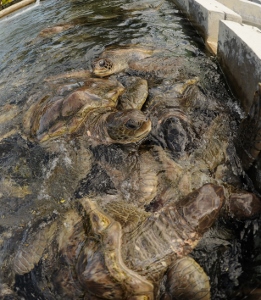
Turtle number increase cuts meat price
 (CNS): The Cayman Turtle Farm is cutting the price of its meat as a result of a more productive breeding season and better management of the animals. With thousands of the endangered animals at the farm, what appears to be improvements in husbandry, diet and the overall health of the turtles has led to an increase in numbers, which the farm said has enabled them to reduce the normally hefty price tag. With over 8,000 turtles currently at the farm, the growth in numbers will also result in more of the farmed animals released into the wild, even though question remain as to whether the release programme is an appropriate method of conservation.
(CNS): The Cayman Turtle Farm is cutting the price of its meat as a result of a more productive breeding season and better management of the animals. With thousands of the endangered animals at the farm, what appears to be improvements in husbandry, diet and the overall health of the turtles has led to an increase in numbers, which the farm said has enabled them to reduce the normally hefty price tag. With over 8,000 turtles currently at the farm, the growth in numbers will also result in more of the farmed animals released into the wild, even though question remain as to whether the release programme is an appropriate method of conservation.
The reduction in price has been welcomed by the Department of Environment (DoE) as cheaper farmed meat is expected to reduce poaching pressure on the wild population. DoEDirector Gina Ebanks-Petrie said that any drop in meat prices would reduce incentives for illegal take, "so the DoE welcomes the planned reduction in the cost of turtle meat from the Farm.”
CTF Managing Director Tim Adam said the price decrease is the result of several factors, including increased egg and hatchling production at the farm.
“Over the last breeding season in 2012, the Cayman Turtle Farm greatly increased egg and hatchling production as a result of various actions including enhancements to the breeder diet, removal of unproductive breeders and changing the ratio of males to females in the breeding pond, as well as younger breeders becoming more mature and so better able to reproduce,” Adam said. “During the current 2013 breeding season now in progress, results so far indicate numbers similar to and even a bit ahead of last year’s numbers of egg production, which produced a bumper crop of hatchlings.”
Adam also said that lowering turtle meat prices helps in conservation efforts as cheaper legal farmed turtle meat means less incentive to poach turtles from the wild. “We strongly believe that a reduction in turtle meat prices will help to further reduce or eliminate poaching of wild turtles,” he said.
The CTF boss said that as many as 400 turtles could be released into the wild as a result of the increased hatchling production.
“We have completed work on additional quarantine tanks and our veterinarian, Dr Martha Keller, has implemented new pre-release quarantine protocols,” Adam explained. “The first turtles to be released under these new protocols are currently in the quarantine process, which runs for approximately three months. We anticipate that the Farm will be able to release up to 100 turtles at a time, so as many as 400 turtles could be released each year,” he added.
The new prices, which will come into effect from 1 September, are $19.00 per pound for turtle steak, $9.00 per pound for turtle stew meat, $7.00 per pound for menavelins, and $4.50 per pound for bone. All prices are in CI$ and each type of product is sold in five-pound lots. For turtle stew, for example, that is a 25% price drop.
However, the Cayman Turtle Farm remains the target of an international campaign to stop the breeding of the animals for meat and to re-invent the facility as a conservation centre.
The World Society for the Protection of Animals is still attempting to communicate with CTF management following its damning report, which exposed significant problems at the farm. The attention from the WSPA did lead to some improvements, including the recruitment of a full time vet and better conditions in the storage facilities.
However, concerns remain about the conditions and about releasing farm-reared turtles into the wild, regardless of the quarantine process.
In addition to the issues raised by the animal welfare charity, the farm continues to be a significant drain on public coffers, sucking in a subsidy of around $10 million per annum of public money to keep it open.
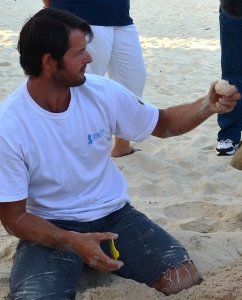
Special funding helps DoE help local turtles
 (CNS): Cash that came from the UK and was distributed from the governor’s office is helping the Department of Environment better understand and measure the impact of the Turtle Farm’s release programme on wild the population of turtles nesting in Cayman and improve the level of information and research about green turtles and improve their protection. The funding has allowed the DoE to extend its turtle monitoring programme – particularly at night. The monitoring process involves locating and tagging nesting green turtles with flipper tags and microchips, documenting evidence of CTF tags, and taking genetic samples.
(CNS): Cash that came from the UK and was distributed from the governor’s office is helping the Department of Environment better understand and measure the impact of the Turtle Farm’s release programme on wild the population of turtles nesting in Cayman and improve the level of information and research about green turtles and improve their protection. The funding has allowed the DoE to extend its turtle monitoring programme – particularly at night. The monitoring process involves locating and tagging nesting green turtles with flipper tags and microchips, documenting evidence of CTF tags, and taking genetic samples.
Although the DoE has carried out a comprehensive daytime monitoring survey since 1998 it has previously lacked the resources for intensive night monitoring.
"We sincerely thank the Governor’s Office for their support. The Turtle Farm has released more than 30,000 turtles since 1968 and we needed this funding to track how many are returning to nest in Cayman and to assist in the conservation of our wild turtle populations,” said Janice Blumenthal, a research officer with the DoE.
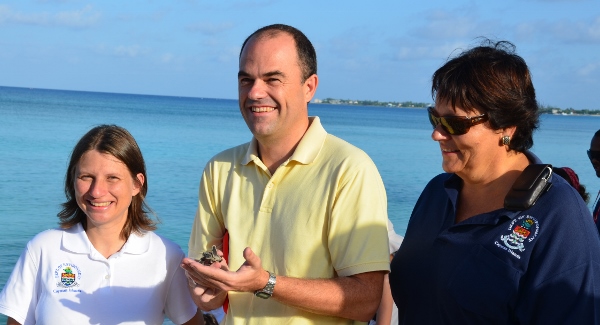 The research covers turtle activity on beaches around Grand Cayman and includes conducting a comprehensive study of all turtle nesting activity as well as tagging nesting female turtles to individually identify them and documenting the presence of Cayman Turtle Farm tags.
The research covers turtle activity on beaches around Grand Cayman and includes conducting a comprehensive study of all turtle nesting activity as well as tagging nesting female turtles to individually identify them and documenting the presence of Cayman Turtle Farm tags.
Photo (L-R) DoE Research Officer, Janice Blumenthal; Governor’s Staff Officer, Tom Hines; DoE Director, Gina Ebanks-Petrie gather to observe a new turtle hatchling
The DoE is also collecting tissue samples from nesting green turtles for future analysis, increasing its enforcement presence on beaches at night to reduce illegal take, as well as intervention and public education to reduce the impact of light pollution on nesting females and emerging hatchlings.
Commenting on the grant from the Governor’s Office, Staff Officer Tom Hines said it was a well-deserved project.
“This year we received many good bids for funding. However, deciding to support the Department of Environment’s bid was easy because it was well-written, focused on making an impact, and aligned with one of our priorities to preserve the biodiversity in the UK and the Overseas Territories. This project will do just that,” he added.
The DoE began local turtle monitoring in 1998 with assistance from the UK Government. Since then, the programme has grown significantly and is now a leading one in the region.
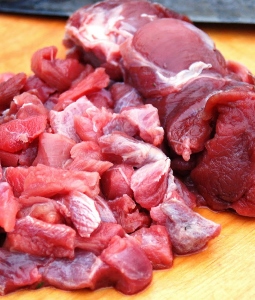
Thieves steal turtle meat
 (CNS): The police are on the hunt for thieves who reportedly stole an undisclosed but reportedly significant quantity of turtle meat from the Cayman Turtle Farm over the weekend. Officials from the farm said the theft was discovered early Monday morning (24 June) and reported to the Royal Cayman Islands Police Service, which is now conducting an investigation. The CTF said it remains the only legal source of turtle meat in the Cayman Islands but it made no further comment on the break-in. It is not clear how the thieves managed to gain entry to the meat storage areas or exactly when they broke in.
(CNS): The police are on the hunt for thieves who reportedly stole an undisclosed but reportedly significant quantity of turtle meat from the Cayman Turtle Farm over the weekend. Officials from the farm said the theft was discovered early Monday morning (24 June) and reported to the Royal Cayman Islands Police Service, which is now conducting an investigation. The CTF said it remains the only legal source of turtle meat in the Cayman Islands but it made no further comment on the break-in. It is not clear how the thieves managed to gain entry to the meat storage areas or exactly when they broke in.
Anyone with information on the break-in or about people attempting to sell turtle meat is asked to contact the RCIPS West Bay Police Station at 949-3999 or Crime Stoppers on 800-TIPS (800-8477)

Animal charity and farm fail to agree on report
 (CNS): Hopes of a possible working relationship between the World Society for Protection of Animals and the Cayman Turtle Farm have been dashed after the charity said Monday that talks between the parties have broken down as the farm refuses to recognise the animal welfare problems caused by its intensive farming operation. Having spearheaded a major international campaign to persuade the Turtle Farm to begin moving away from farming to a facility committed purely to conservation, the animal activists said that the CTF management wants the charity to renounce the findings of its year-long investigation and accept the farm's recent inspection report as “authoritative”.
(CNS): Hopes of a possible working relationship between the World Society for Protection of Animals and the Cayman Turtle Farm have been dashed after the charity said Monday that talks between the parties have broken down as the farm refuses to recognise the animal welfare problems caused by its intensive farming operation. Having spearheaded a major international campaign to persuade the Turtle Farm to begin moving away from farming to a facility committed purely to conservation, the animal activists said that the CTF management wants the charity to renounce the findings of its year-long investigation and accept the farm's recent inspection report as “authoritative”.
Standing by WSPA’s evidence, Campaign Leader Dr Neil D’Cruze said the WSPA had hoped the farm’s recently self-commissioned report would provide a scientific basis for on-going discussion, but the charity said it lacked detail and was not broad enough to be treated as an authoritative piece of work.
“WSPA’s animal welfare concerns are based on robust evidence that demonstrates commercial sea turtle farming is cruel and inhumane. We see no reason to deny what we have already proven through scientific evidence,” he said. “WSPA cannot treat the Farm's report authoritatively as it only looks at the symptoms of poor welfare rather than the causes. Even if the Farm was to fulfil every one of the report’s recommendations, turtles would still suffer and the same problems would continue to re-occur”.
Having reviewed the report, the WSPA said in an official statement that it was not an authoritative piece of work that could serve as the basis for on-going constructive dialogue as the charity had significant concerns regarding the scientific and technical calibre of the report.
While the inspectors are recognized experts in the field of sea turtle biology, their report lacks the level of detail required for the reader to confirm that the report’s findings represent an accurate and unbiased reflection of the CTF’s operation.
No details are provided regarding how the panel assessed the CTF’s operation and there are concerns of bias as several of the inspectors have had prior and on-going collaborations with the farm.
“The WSPA feels that the independent nature of the inspection, subsequent report and recommendations within can be legitimately called into question,” it stated. “There are several key findings that contradict evidence collated via our own on-going in-depth investigation into the CTF and its operating methods.
"The WSPA challenges statements made in the report that there are ‘no significant issues of concern in the public facing aspect of the operation, that the handling of animals by guests raises no concerns or that there is 'strong evidence for the positive conservation impact of the CTF’.”
The WSPA has published photographic evidence of animal health and welfare concerns, such as inadequate captive conditions, stereotypic behaviours, injuries and disease in the public facing area of its operation.
The charity also notes that the report’s recommendations are aimed at addressing the symptoms rather than the root causes and, despite the CTF’s best efforts, severe animal welfare concerns will remain. The recommendations are fundamentally flawed, the WSPA states, as they are based on the false assumption that the green sea turtles housed at the CTF represent domesticated animals when there is no proof that there has a change in their phenotypical expression or genotype that enables them to cope better in intensive captive conditions than their wild counterparts.
Although the farm has not yet become a campaign issue, as there still remains broad support locally for breeding turtles to eat, the WSPA is still hopeful that the new Government will re-evaluate the future of the Cayman Turtle Farm for the sake of the green sea turtles as well as the Caymanian tax-payer.
The most recent annual reports from the farm re-confirmed the continuing subsidies to the tune of almost $10 million per annum that is being pumped into the farm because of on-going losses.
See full statement below.